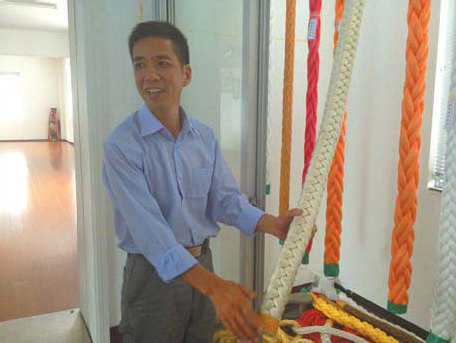Boats to spaceships: Rope maker moves up value chain
Updated: 2013-09-06 07:20
By Yan Yiqi (China Daily)
|
||||||||
The successful missions of China's Shenzhou series of spaceships were made possible through the efforts of millions.
Among the contributors to this historic project are Zhejiang's innovative enterprises, which dedicate their research to furthering the cause of the nation's aerospace industry.
Zhejiang Four Brothers Rope is located in a small village of Taizhou, the province's eastern coastal city. A three-hour drive from downtown Taizhou, the company appears to be no different from any other small privately run factories in the province at first glance.
But as the manufacturer of hawsers, a type of thick cable, the company has played a vital role in the Shenzhou project since 2000.
With a diameter of 36 mm, its hawsers are made from ultra-high-molecular-weight polyethylene, a new material developed using high technology.
To win the contract, the company bested international suppliers, including the Royal DSM of the Netherlands.
|
Four Brothers Chairman Li Maochang shows products. The company has played an important role in China's aerospace industry. |
The 80-meter-long hawser is capable of pulling up to 60 metric tons. Hawsers made from the same material were also used on the Liaoning, China's first aircraft carrier.
It might be hard to imagine that such a highly competitive supplier for China's two most strategically important projects started as a small factory that produced handmade ropes for fishermen.
In the early 1950s, Zhejiang villager Li Changfu started a small business making rope from natural fibers. The rope was sold to fishermen in his village and the surrounding area. The manufacturing process was simple and done entirely by hand.
After he passed away, his four sons inherited this business and are now co-owners of the Zhejiang Four Brothers Rope Company, which was established in 1980.
"At that time, Taizhou port was underdeveloped. My brother Li Maoju went to Shanghai and bought used rope from international liners," said Li Maochang, chairman of the company.
"We studied their technique and reproduced the ropes. These ropes were warmly welcomed among fishermen in Taizhou."
After that attempt, a bold idea hit the four brothers. They wanted to sell their own ropes to international liners.
"It was a dream that no one in our village had ever dreamt of at that time, but I think that because we dared to dream, we were able to become the industry leader in our country now," he said.
The four brothers shifted their business focus from providing ropes for fishermen to making hawsers for vessels and liners. Today, more than 70 percent of liners and cargo carriers in Ningbo-Zhoushan port and Shanghai port, China's two largest international ports, use hawsers manufactured by their company.
From a low-value-added business to high-tech products, the company had successfully finished the task of industrial upgrading while many other private companies were still struggling.
Last year, the company's sales revenue reached 70 million yuan ($11 million). Exports accounted for 30 percent of that.
Li said that the most important contributor to the company's success in its own field is that they always look up to the strongest player in the market.
Tech exchanges
Obama Rope MFG Co of Japan is one of the leading companies producing ropes and hawsers in the world. Just like Four Brothers, Obama Rope is also a family business that has been developing for five generations.
"Our equipment is no worse than theirs, and workers of both companies are all very experienced, but our products are behind in terms of technology," said Li.
In order to catch up with the world's leader in this industry, the four brothers invited researchers and workers of Obama Rope to visit their factory and exchange technical expertise. The two companies have signed technological exchange deals to better cooperate.
"They have better techniques, and we have cheaper labors and materials. The combination enables both of our companies to benefit from the global market," said Li.
Li said that the cooperation with Obama Rope demonstrates the company's commitment to development based on innovation and improvement of technology.
"Technology is the only way out for companies like us," he said.
By the end of this process, the company will have established a research and development center focused on developing new materials.
"It took us two and a half months to develop the material for the hawser used on the Shenzhou III spaceship. With the new R&D center, we can shorten this period to a minimum to realize higher profits," said Li.
Le Weizhang, senior engineer for rope and hawser testing at the East China Sea Fisheries Research Institute, said that he was impressed by the company during the time he spent cooperating with their researchers.
"The company was already a very competitive rope manufacturer in China before they became determined to develop high-end hawsers," he said.
"I think it is their refusal to be complacent with their current achievements that makes them successful now."
The Zhejiang Four Brothers Rope is just one example of how enterprises in Zhejiang pursuing a new mode of development based on innovation. Their efforts help to fuel the sustainable development of the province's economy.
More competitive
"Made in Zhejiang" is no longer a symbol of low-end products with poor quality. Many of Zhejiang's products can now be found in high-tech industries like aerospace and also in the global market, signaling that they are gradually stepping up the value chain and becoming more competitive.
Zhejiang Governor Li Qiang said in July that the province should do everything in its power to speed up industrial upgrading. The provincial government is pushing polluting and energy-intensive companies with low added value to shut down or upgrade equipment and technology.
"We should make room for high-added-value and energy-efficient companies to develop, replace human labor with machines, save factory land usage and develop e-commerce platforms," he said.
yanyiqi@chinadaily.com.cn
(China Daily USA 09/06/2013 page19)

 China, Russia a step closer on gas supply
China, Russia a step closer on gas supply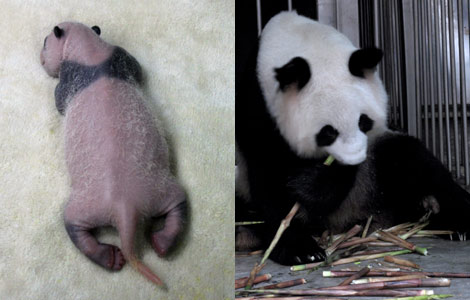
 18-year-old panda conceives triplets
18-year-old panda conceives triplets
 Testing times for G20 leaders
Testing times for G20 leaders Homemade choppers make aerobatic stunt debut
Homemade choppers make aerobatic stunt debut
 World-class partners bring NBA global games to Chinese fans
World-class partners bring NBA global games to Chinese fans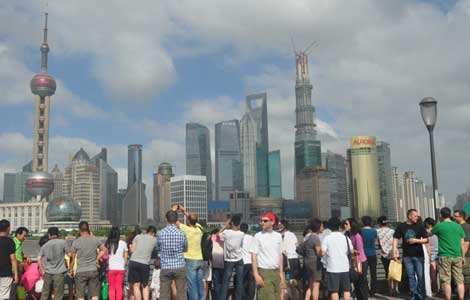
 Shanghai's visa-free policy lifts tourism
Shanghai's visa-free policy lifts tourism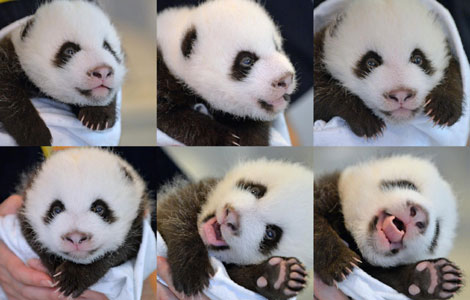
 Panda twin cub born at Atlanta Zoo
Panda twin cub born at Atlanta Zoo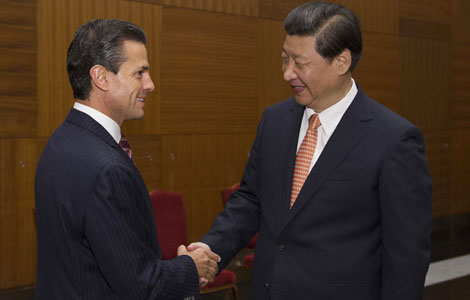
 Xi, Mexican president meet for third time
Xi, Mexican president meet for third time
Most Viewed
Editor's Picks

|

|

|

|

|

|
Today's Top News
Beijing's new product briefing a first for Apple
China, Russia a step closer on gas supply
Brazil asks for apology from US on spying
Japan to test wall for leaking water
Low-budget education abroad for working-class
Shanghai's visa-free policy lifts tourism
Films aim for success abroad
Xi vows economic reform at G20 summit
US Weekly

|

|
